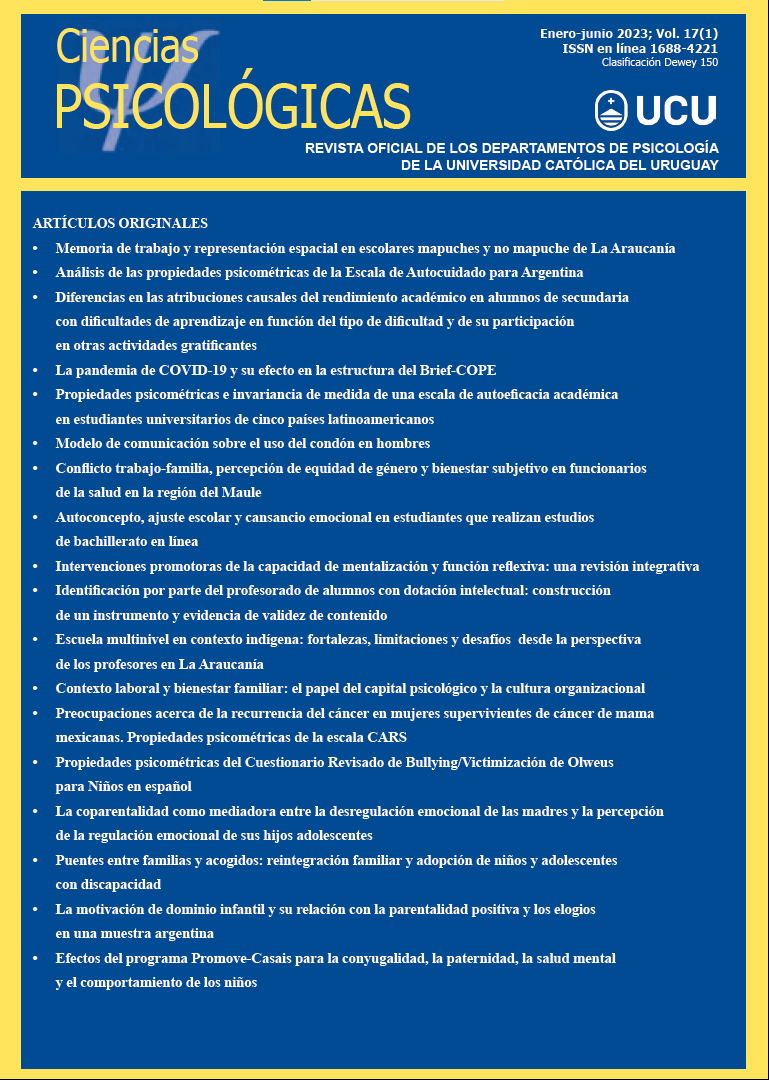Contexto laboral e bem-estar na família: o papel do capital psicológico e da cultura organizacional
DOI:
https://doi.org/10.22235/cp.v17i1.2671Palavras-chave:
demandas laborais, recursos laborais, interface família-trabalho, bem-estar na famíliaResumo
O conflito e o enriquecimento trabalho família são processos intimamente correlacionados. Este estudou usou o Modelo de Recursos Trabalho-Família para investigar os efeitos diretos de uma demanda (demanda percebida do trabalho) e de um recurso (suporte social no trabalho) contextual do trabalho em um resultado na família (florescimento na família), assim como o papel mediador de um recurso pessoal (capital psicológico positivo) e o papel moderador de um recurso macro (cultura organizacional associada aos valores de satisfação e bem-estar dos trabalhadores) nestas relações. A amostra foi composta por 1052 trabalhadores brasileiros, de ambos os sexos (72,5 % mulheres), pertencentes a 50 organizações. Os resultados encontrados na Modelagem de Equações Estruturais Multinível forneceram suporte empírico para o modelo, confirmando as relações que foram testadas. Esses achados trazem importantes implicações teóricas e práticas para a relação família-trabalho, ao demonstrar como os diferentes processos imbricados na interface trabalho-família podem ocorrer e como podem contribuir para a qualidade de vida no contexto familiar.
Downloads
Referências
Allen, T. D., Cho, E., & Meier, L. L. (2014). Work-family boundary dynamics. Annual Review of Organizational Psychology and Organizational Behavior, 1(1), 99-121. https://doi.org/10.1146/annurev-orgpsych-0314130091330
Azim, M. T., Fan, L., Uddin, M. A., Jilani, M. M. A. K., & Begum, S. (2019). Linking transformational leadership with employees’ engagement in the creative process. Management Research Review, 42, 837-858. https://doi.org/10.1108/mrr-08-2018-0286
Chan, X. W., Kalliath, P., Chan, C., & Kalliath, T. (2019). How does family support facilitate job satisfaction? Investigating the chain mediating effects of work–family enrichment and job‐related well‐being. Stress and Health, 36(1), 97-104. https://doi.org/10.1002/smi.2918
Diener, E., Wirtz, D., Tov, W., Kim-Prieto, C., Choi, D.W., Oishi, S., & Biswas-Diener, R. (2010). New well-being measures: Short scales to assess flourishing and positive and negative feelings. Social Indicators Research, 97(2), 143-156. https://doi.org/10.1007/s11205-009-9493-y
Ferreira, M. C. & Assmar, E. M. L. (2008). Cultura organizacional. In M. M. M. Siqueira (Ed.), Medidas do comportamento organizacional: Ferramentas de diagnóstico e de gestão (pp. 125-137). Artmed.
Ford, M., Wang, Y.-R., & Huh, Y. (2018). Work, the work-family interface, and subjective well-being. In E. Diener, S. Oishi, & L. Tay (Eds.), Handbook of well-being, (pp. 1-20). DEF Publishers.
Gabardo-Martins, L. M. D. & Ferreira, M. C. (2019). Propriedades psicométricas da Escala de Demandas Percebidas do Trabalho e da Família. Avaliação Psicológica, 18(3), 276-284. https://dx.doi.org/10.15689/ap.2019.1803.16152.07
Gabardo-Martins, L. M. D., Ferreira, M. C., & Valentini, F. (2017). Family resources and flourishing at work: The role of core self-evaluations. Paidéia (Ribeirão Preto), 27(68), 331-338. https://doi.org/ 10.1590/1982-43272768201711.
Gabardo-Martins, L. M. D., Ferreira, M. C., & Valentini, F. (2021). Testing the two directions of the work–family interface: a diary study. The Spanish Journal of Psychology, 24, E38. https://doi.org/10.1017/SJP.2021.36
Greenhaus, J. & Beutell, N. (1985). Sources of conflict between work and family roles. Academy of Management Review, 10(1), 76-88. https://doi.org/10.5465/AMR.1985.4277352
Greenhaus, J. & Powell, G. (2006). When work and family are allies: A theory of work-family enrichment. Academy of Management Review, 31(1), 72-92. https://doi.org/10.5465/AMR.2006.19379625
Instituto Brasileiro de Geografia e Estatística. (2020). Demografia das empresas. https://acortar.link/Fk4MEq
Jordan, P. J. & Troth, A. C. (2020). Common method bias in applied settings: The dilemma of researching in organizations. Australian Journal of Management, 45(1), 3-14. https://doi.org/10.1177/0312896219871976
Kamei, H., Ferreira, M. C., Valentini, F., Peres, M. F. P., Kamei, P. T., & Damásio, B. F. (2018). Psychological Capital Questionnaire - short version (PCQ-12): Evidence of validity of the Brazilian version. Psico-USF, 23(2), 203-214. https://doi.org/10.1590/1413-82712018230202
Keyes, C. L. M., Shmotkin, D., & Ryff, C. D. (2002). Optimizing well-being: The empirical encounter of two traditions. Journal of Personality and Social Psychology, 82(6), 1007-1022. https://doi.org/10.1037/0022-3514.82.6.1007
Kutty, S. R. S. (2018). Impact of working hours on family well-being, health, and lifestyle of women employees working in the It/Bpo sector. International Journal of Applied Research, 4(8), 164-175.
Luthans, F., Youssef, C. M. E., & Avolio, B. (2007). Psychological capital: Developing the Human Competitive Edge. Oxford University Press.
Mendonça, H., Caetano, A., Ferreira, M. C., Sousa, I. F., & Silva, A. J. (2014). Florescimento e afetos no trabalho. In M. M. M. Siqueira (Ed.), Novas medidas de comportamento organizacional: Ferramentas de diagnóstico e de gestão, (pp. 172-177). Artmed.
Saha, S. & Kumar, S. P. (2018). Organizational culture as a moderator between affective commitment and job satisfaction. International Journal of Public Sector Management, 31(2), 184-206. https://doi.org/ 10.1108/IJPSM-03-2017-0078
Skomorovsky, A., Hujaleh, F., & Wolejszo, S. (2015). Intimate partner violence in the Canadian armed forces: The role of family stress and its impact on well-being. Military Medicine, 180(7), 809-816. https://doi.org/ 10.7205/MILMED-D-14-00447
Tamayo, M. R., Pinheiro, F. A., Tróccoli, B. T., & Paz, M. G. T. (2000). Construção e validação da Escala de Suporte Organizacional Percebido (ESOP) [Abstract]. Anais da Reunião Anual da Sociedade Brasileira para o Progresso da Ciência, Sociedade Brasileira de Psicologia, p. 52.
Tement, S. (2014). The role of personal and key resources in the family-to-work enrichment process. Scandinavian Journal of Psychology, 55(5), 489-496. https://doi.org/10.1111/sjop.12146
Ten Brummelhuis, L. L. & Bakker, A. B. (2012). A resource perspective on the work-home interface: The Work-Home Resources Model. The American Psychologist, 67(7), 545-556. https://doi.org/10.1037/a0027974
Xia, Y. & Yang, Y. (2019). RMSEA, CFI, and TLI in structural equation modeling with ordered categorical data: The story they tell depends on the estimation methods. Behavior Research Methods, 51, 409-428. https://doi.org/10.3758/s13428-018-1055-2
Downloads
Publicado
Como Citar
Edição
Secção
Licença
Direitos de Autor (c) 2023 Universidad Católica del Uruguay

Este trabalho encontra-se publicado com a Licença Internacional Creative Commons Atribuição 4.0.
















